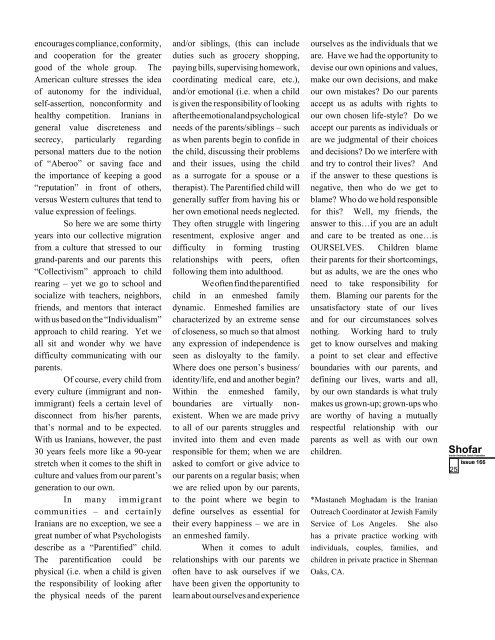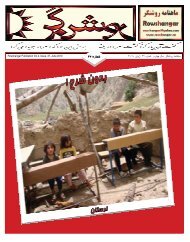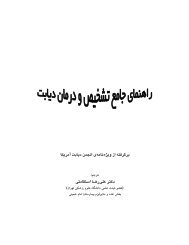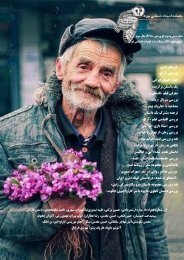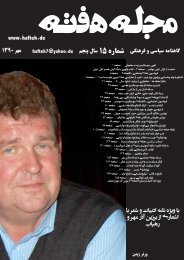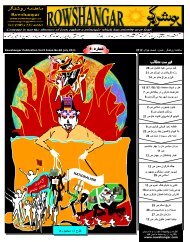166 - ketab farsi
166 - ketab farsi
166 - ketab farsi
Create successful ePaper yourself
Turn your PDF publications into a flip-book with our unique Google optimized e-Paper software.
encourages compliance, conformity,<br />
and cooperation for the greater<br />
good of the whole group. The<br />
American culture stresses the idea<br />
of autonomy for the individual,<br />
self-assertion, nonconformity and<br />
healthy competition. Iranians in<br />
general value discreteness and<br />
secrecy, particularly regarding<br />
personal matters due to the notion<br />
of “Aberoo” or saving face and<br />
the importance of keeping a good<br />
“reputation” in front of others,<br />
versus Western cultures that tend to<br />
value expression of feelings.<br />
So here we are some thirty<br />
years into our collective migration<br />
from a culture that stressed to our<br />
grand-parents and our parents this<br />
“Collectivism” approach to child<br />
rearing – yet we go to school and<br />
socialize with teachers, neighbors,<br />
friends, and mentors that interact<br />
with us based on the “Individualism”<br />
approach to child rearing. Yet we<br />
all sit and wonder why we have<br />
difficulty communicating with our<br />
parents.<br />
Of course, every child from<br />
every culture (immigrant and nonimmigrant)<br />
feels a certain level of<br />
disconnect from his/her parents,<br />
that’s normal and to be expected.<br />
With us Iranians, however, the past<br />
30 years feels more like a 90-year<br />
stretch when it comes to the shift in<br />
culture and values from our parent’s<br />
generation to our own.<br />
In many immigrant<br />
communities – and certainly<br />
Iranians are no exception, we see a<br />
great number of what Psychologists<br />
describe as a “Parentified” child.<br />
The parentification could be<br />
physical (i.e. when a child is given<br />
the responsibility of looking after<br />
the physical needs of the parent<br />
and/or siblings, (this can include<br />
duties such as grocery shopping,<br />
paying bills, supervising homework,<br />
coordinating medical care, etc.),<br />
and/or emotional (i.e. when a child<br />
is given the responsibility of looking<br />
after the emotional and psychological<br />
needs of the parents/siblings – such<br />
as when parents begin to confide in<br />
the child, discussing their problems<br />
and their issues, using the child<br />
as a surrogate for a spouse or a<br />
therapist). The Parentified child will<br />
generally suffer from having his or<br />
her own emotional needs neglected.<br />
They often struggle with lingering<br />
resentment, explosive anger and<br />
difficulty in forming trusting<br />
relationships with peers, often<br />
following them into adulthood.<br />
We often find the parentified<br />
child in an enmeshed family<br />
dynamic. Enmeshed families are<br />
characterized by an extreme sense<br />
of closeness, so much so that almost<br />
any expression of independence is<br />
seen as disloyalty to the family.<br />
Where does one person’s business/<br />
identity/life, end and another begin?<br />
Within the enmeshed family,<br />
boundaries are virtually nonexistent.<br />
When we are made privy<br />
to all of our parents struggles and<br />
invited into them and even made<br />
responsible for them; when we are<br />
asked to comfort or give advice to<br />
our parents on a regular basis; when<br />
we are relied upon by our parents,<br />
to the point where we begin to<br />
define ourselves as essential for<br />
their every happiness – we are in<br />
an enmeshed family.<br />
When it comes to adult<br />
relationships with our parents we<br />
often have to ask ourselves if we<br />
have been given the opportunity to<br />
learn about ourselves and experience<br />
ourselves as the individuals that we<br />
are. Have we had the opportunity to<br />
devise our own opinions and values,<br />
make our own decisions, and make<br />
our own mistakes? Do our parents<br />
accept us as adults with rights to<br />
our own chosen life-style? Do we<br />
accept our parents as individuals or<br />
are we judgmental of their choices<br />
and decisions? Do we interfere with<br />
and try to control their lives? And<br />
if the answer to these questions is<br />
negative, then who do we get to<br />
blame? Who do we hold responsible<br />
for this? Well, my friends, the<br />
answer to this…if you are an adult<br />
and care to be treated as one…is<br />
OURSELVES. Children blame<br />
their parents for their shortcomings,<br />
but as adults, we are the ones who<br />
need to take responsibility for<br />
them. Blaming our parents for the<br />
unsatisfactory state of our lives<br />
and for our circumstances solves<br />
nothing. Working hard to truly<br />
get to know ourselves and making<br />
a point to set clear and effective<br />
boundaries with our parents, and<br />
defining our lives, warts and all,<br />
by our own standards is what truly<br />
makes us grown-up; grown-ups who<br />
are worthy of having a mutually<br />
respectful relationship with our<br />
parents as well as with our own<br />
children.<br />
*Mastaneh Moghadam is the Iranian<br />
Outreach Coordinator at Jewish Family<br />
Service of Los Angeles. She also<br />
has a private practice working with<br />
individuals, couples, families, and<br />
children in private practice in Sherman<br />
Oaks, CA.<br />
25<br />
<strong>166</strong>


